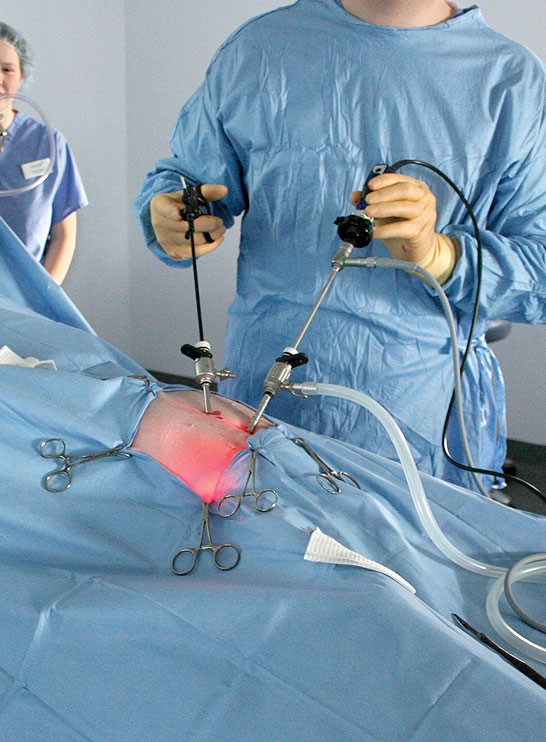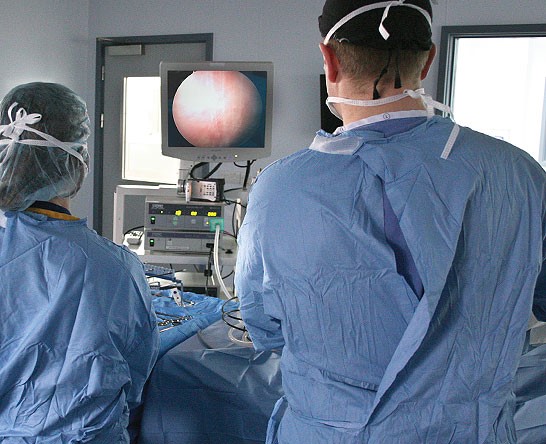Why should I bring my pet to Willows for an advanced laparoscopic procedure?
Willows is one of Europe’s leading small animal referral centres. Our state-of-the-art hospital is led by internationally renowned Specialists, committed to providing the highest standards of veterinary care. Our Soft Tissue Service is one of the few in the UK to offer advanced laparoscopic (‘keyhole’) procedures.
Our team of Surgeons are supported by our multi-disciplinary team of Specialists across a number of disciplines including Anaesthesia, Diagnostic Imaging and Emergency and Critical Care. Willows also has a large, dedicated team of Vets, Nurses, and clinical support staff available 24 hours a day, every day of the year to provide the best possible care for your pet.

What are advanced laparoscopic procedures?
Laparoscopy is an endoscopic (camera) examination of the abdominal cavity (‘tummy’), either for diagnostic or treatment purposes. Advanced laparoscopic procedures include:
- Retained testicle removal
- Gastropexy
- Cystotomy
- Cholecystectomy (gallbladder removal)
- Nephrectomy (kidney removal)
- Adrenalectomy (adrenal gland removal), amongst others.
The advantages of laparoscopy over conventional surgery include:
- Reduced pain from the surgical wounds, the pet is more comfortable post-surgery
- Two to four smaller surgical wounds
- Fewer stitches
- A faster return to normal activity, due to improved patient comfort and reduced scar tissue formation.
For advanced laparoscopic (‘keyhole’) procedures, three to four small incisions (10-15mm in length) are needed, and these are normally closed without the need for external stitches.
What are the most common reasons for advanced laparoscopic procedures?
The most common advanced laparoscopic procedures include:
- Gastropexy: Attaching the stomach to the tummy wall, to prevent gastric dilation and volvulus (GDV) in predisposed breeds. This can be performed at the same time as a laparoscopic ovariectomy (‘keyhole spay’)
- Cholecystectomy: Gallbladder removal, in patients with gallbladder impaction (gallbladder mucocele) NOT causing clinical signs or obstruction
- Adrenalectomy: Removal of a tumour of the adrenal gland, when it fits certain criteria of size and invasiveness
It is important to note that not all cases are suitable for laparoscopic (‘keyhole’) surgery, and the decision to perform laparoscopic versus standard surgery is based on various factors, which would be discussed at the time of consultation.

What can I expect if my pet undergoes an advanced laparoscopic procedure?
Firstly, a consultation will be performed with a Soft Tissue Specialist to discuss the underlying condition, and whether a laparoscopic (‘keyhole’) procedure can be performed. The surgeon will discuss all aspects of the procedure with you. The surgery will not usually be performed the same day as the consultation.
Pets undergoing laparoscopic surgery should be starved from 10pm the night before surgery with free access to water until the time of admission to the hospital. The surgery is usually performed in the morning, and pets may be admitted early the same day, or the day before.
As with humans undergoing laparoscopic surgery, we do ask that we are given permission to convert to a more conventional approach during the procedure if necessary. This may be required if the laparoscopic procedure cannot be safely completed.
Patients will most likely stay in hospital for one night or more, depending on the procedure performed. Clear instructions will be given regarding postoperative care, and these instructions will be provided in the written discharge instructions.
To save this page as a PDF, click the button and make sure “Save as PDF” is selected.
Soft Tissue Surgery
Find out more
To assist owners in understanding more about Soft Tissue Surgery we have put together a range of information sheets to talk you through the some of the more common soft tissue conditions seen and treated by our Specialists.
Condition:
Treatment:

